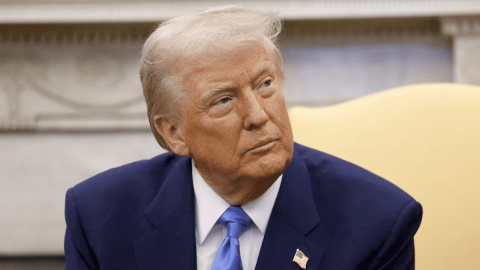Trump’s 100-Day Approval Hits Historic Low Amid Economic Anxiety, Tariffs and Policy Backlash
Donald Trump’s second term is off to a rocky start, with his approval rating at its weakest point in modern presidential history. According to a recent ABC News/Washington Post/Ipsos poll, only 39% of Americans approve of his performance after the first 100 days, while 55% disapprove. Against a backdrop of rising economic fears and controversial trade policies, public sentiment suggests growing disillusionment across political lines. The following analysis dives into the underlying factors behind Trump's plummeting ratings, the economic and political risks ahead, and the broader implications for the U.S. economy and global standing.
Historical Perspective: Trump’s Record-Low Standing
In an era where presidential approval ratings have steadily declined, Trump’s current 39% approval sets a stark new benchmark. Comparatively:
- Joe Biden: 54% approval at 100 days
- Barack Obama: 62% approval
- George W. Bush: 63% approval
- Harry Truman: An extraordinary 87% approval (highest in post-war history)
Moreover, Trump's 100-day figure in 2025 represents a 6 percentage point drop from his 2017 first-term mark, underscoring a deepening erosion of support among critical demographics, particularly independents, where his approval has plunged to just 31%—matching his previous lowest point.
According to long-term data, the average presidential 100-day approval rating from 1938 to 2012 is approximately 54%, placing Trump’s figures alarmingly below the historical norm.
Economic Fears: Recession on the Horizon?
While Trump campaigned on promises of a financial renaissance, the electorate’s verdict paints a starkly different picture:
- 72% of Americans believe Trump's policies could push the economy into a recession in the near term.
- 73% rate the current economy as "bad."
- 71% expect his tariffs to drive inflation higher.
Wall Street's alarm mirrors public anxiety. JPMorgan Chase has raised the likelihood of a recession to 60% if Trump’s tariffs persist, while Goldman Sachs increased their probability from 20% to 35% following Trump’s announcement of a 10% global import tariff.
Reuters/Ipsos data further indicates that only 37% approve of Trump's handling of the economy—his worst showing on economic stewardship since 2017. Notably, even among Americans who supported Trump in the 2024 election, approximately 20% express disapproval of his economic measures, highlighting growing fractures within his political base.
Tariff Policies: An Unpopular Gamble
Tariffs, a centerpiece of Trump’s economic agenda, are widely seen as a double-edged sword:
| Concern | Public Sentiment |
|---|---|
| Rising Consumer Prices | Over 80% expect prices to increase significantly |
| Personal Financial Strain | 55% fear their personal finances will worsen |
| Recession Risk | 72% believe tariffs could trigger a recession |
| Global Standing | 52% see harm to America’s reputation |
| Policy Uncertainty | Businesses struggle with unpredictability |
According to Ipsos polling, approximately 59–64% disapprove of Trump's approach to tariffs, with discontent evident across traditional party lines. Particularly striking is the demographic cross-section of disapproval:
- 61% of young adults (ages 18–34)
- 59% of Americans without college degrees
- 62% of individuals earning under $50,000 annually
Even among Republican voters, the split is becoming more pronounced, with MAGA Republicans showing +74% net approval of tariffs, compared to only +39% net approval among non-MAGA Republicans.
Deepening Recession Anxiety and Inflation Fears
The public sees Trump's tariffs as more than abstract policy—they view them as a direct threat to household stability. About:
- 80% expect consumer prices to rise significantly, particularly for essentials like food, clothing, and electronics.
- 47% anticipate a dramatic spike in prices.
- 55% believe tariffs will directly harm their wallets.
- 53% foresee broader economic damage.
- 52% worry about America’s diminishing influence in global trade arenas.
This pessimism is particularly acute in sectors like manufacturing and agriculture, where retaliatory tariffs are expected to bite hardest.
Comparison with Congressional Democrats: A Pyrrhic Advantage
Despite sagging popularity, Trump holds a slight edge over Congressional Democrats when it comes to perceived competence on major national issues:
- Trump: 37% trust to handle major problems
- Congressional Democrats: 30% trust level
This tepid endorsement reflects a broader dissatisfaction with Washington as a whole rather than robust confidence in Trump's leadership.
Long-Term Risks: Tariffs and Global Competitiveness
Multiple reports, including those from Goldman Sachs and JPMorgan, point to serious structural risks if tariff policies remain unchanged:
Competitive Weakness: Protectionist policies could leave American firms less competitive internationally, undermining the export sector and tech industries.
Global Trade Relationships: Allies such as the European Union, Japan, and Canada are reportedly weighing retaliatory measures, which could spark an escalating trade war.
Business Planning: The lack of strategic clarity is breeding uncertainty in corporate boardrooms, stifling investment, and innovation.
Conclusion: A Fragile Presidency Confronts Economic Crossroads
Donald Trump’s historically low 100-day approval rating highlights a presidency confronting a stark reality: economic anxiety, skepticism over protectionist policies, and a polarized electorate that is increasingly difficult to rally. While Trump's tariff policies enjoy partial support among his core base, the broader electorate—and especially independents—express profound concerns about rising inflation, weakened global standing, and recession risk.
If Trump’s administration fails to provide greater economic clarity and demonstrate tangible improvements, he risks not only economic destabilization but a deeper erosion of political capital that could imperil his legislative agenda and re-election hopes. As America stands at the precipice of economic uncertainty, the next hundred days will be critical in determining whether Trump's second term can course-correct—or whether it will become an enduring case study in squandered political opportunity.
